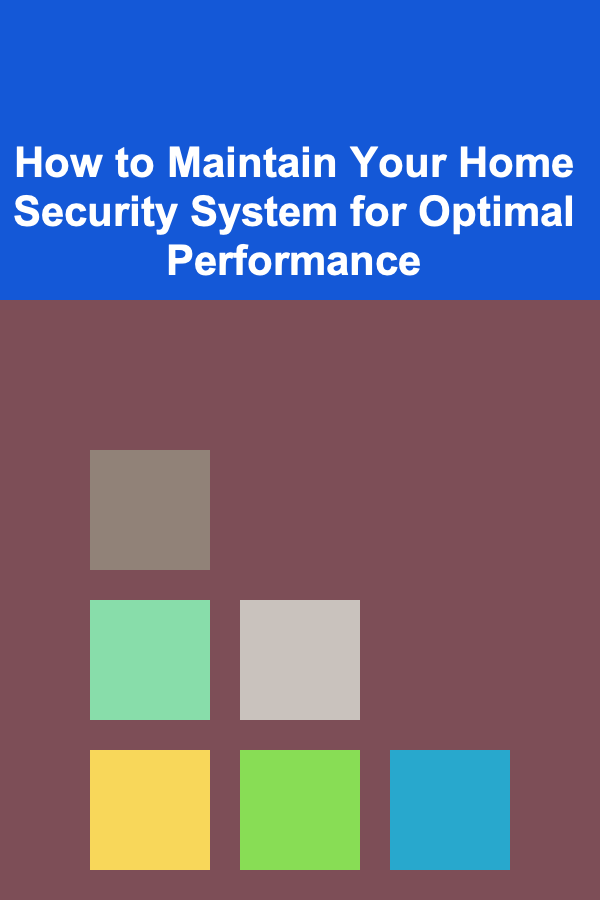
How to Maintain Your Home Security System for Optimal Performance
ebook include PDF & Audio bundle (Micro Guide)
$12.99$9.99
Limited Time Offer! Order within the next:

In today's world, where security is a top concern for homeowners, maintaining a home security system is essential to ensuring that it continues to offer the protection it was designed to provide. With technological advancements and the increasing availability of smart home devices, security systems have become more sophisticated than ever before. However, the effectiveness of these systems largely depends on how well they are maintained.
Maintaining your home security system isn't just about checking the equipment every few months. It requires regular upkeep, monitoring, and even upgrading certain components over time. Just like any other system in your home, a security system can become outdated or face issues if neglected. In this article, we will explore the steps you can take to ensure that your home security system remains in top working order, providing optimal performance when you need it most.
Understand the Components of Your Security System
Before diving into maintenance, it's important to understand the components of your home security system. This understanding will help you monitor each part of the system effectively and perform maintenance tasks correctly.
A. Types of Security Systems
Home security systems vary widely in terms of complexity and features. Some systems offer basic surveillance, while others integrate smart technology, alarms, and home automation systems. The common components you may find in a modern security system include:
- Cameras: These are essential for surveillance. Depending on your setup, they could be indoor, outdoor, or a combination of both. They capture footage, which can be monitored live or stored for future review.
- Alarms: These can include door/window alarms, motion detectors, and glass break detectors. They are triggered when unauthorized access is detected.
- Sensors: Motion detectors, door/window sensors, and glass-break sensors are designed to sense changes in the environment that suggest an intruder is present.
- Control Panel: The control panel is the heart of your security system. It connects all components and allows you to monitor and manage your system.
- Smart Locks and Doorbell Cameras: Many systems now integrate smart locks for doors and doorbell cameras with video feeds, which add an extra layer of security.
- Smart Home Integration: Some systems connect to other smart home devices, such as lighting, thermostats, or voice assistants, offering added convenience and security.
B. Know Your System's Specifications
Each security system is unique, and understanding your system's specifications can help you troubleshoot issues. Take time to familiarize yourself with the user manual or consult your security service provider to fully understand the features, limits, and potential vulnerabilities of your setup.
Perform Regular System Checks
A key part of maintaining optimal performance is performing regular checks to ensure that all components of your security system are functioning properly. It's easy to overlook these checks, but neglecting them can leave your system vulnerable to malfunctions or security gaps.
A. Test Alarms and Sensors
Regular testing of alarms and sensors ensures that they are correctly detecting threats and alerting you when necessary. To test your system:
- Alarm Check: Trigger the alarm system manually or simulate an intrusion. Ensure that it sounds loudly and is connected to any monitoring services you have.
- Sensor Test: Walk in front of motion sensors or open doors/windows with sensors installed to confirm that they trigger the alarms or alerts.
B. Check Camera Feeds
Cameras are one of the most important components of a security system, so regularly checking their functionality is crucial. Be sure to:
- Inspect Camera Angles and Coverage: Ensure that the cameras are still positioned correctly and cover the desired areas. Adjust any that have been displaced by weather, pets, or other factors.
- Check Image Quality: Inspect the clarity of the footage. Poor resolution or pixelation can result from lens smudges, low storage space, or degraded components.
- Ensure Night Vision Works: If your cameras are equipped with night vision, test them in low-light conditions to ensure they are functioning correctly.
C. Inspect Power Sources and Backup Batteries
Many security systems rely on power outlets or battery-operated devices. A sudden power outage or battery failure can render the system ineffective.
- Check Power Supplies: Ensure that all cameras, sensors, and the control panel are properly connected to a power source. Look for loose wires or connection issues.
- Replace Backup Batteries: Most security systems have backup batteries to keep the system running in case of power failure. Replace these batteries at least once a year, or sooner if your system indicates that the batteries are low.
D. Test Remote Access and Notifications
If your system offers mobile app integration, smart home controls, or email notifications, verify that these features are still working properly. Ensure that:
- App Notifications: Check that you are receiving notifications in real time when the system detects any unusual activity.
- Mobile App or Web Access: Test the mobile app or web interface to ensure you can remotely monitor your system, change settings, or view recorded footage.
Keep Software and Firmware Up-to-Date
With many modern security systems connected to the internet, keeping the software and firmware up to date is essential for maintaining security and functionality. Manufacturers regularly release updates to fix bugs, improve system features, and close security vulnerabilities.
A. Automatic Updates
If your system supports automatic updates, ensure that they are enabled. This will allow your system to stay current without requiring manual intervention.
B. Manual Updates
For systems that do not automatically update, check for updates periodically. You can typically find instructions for updating firmware in the system's user manual or on the manufacturer's website.
Ensure Proper Placement and Coverage
The effectiveness of your security system depends largely on how well it is placed around your home. Components such as cameras, sensors, and alarms should be placed strategically to maximize coverage and minimize blind spots.
A. Camera Placement
When positioning cameras, consider the following:
- High-Traffic Areas: Ensure that the cameras are monitoring areas where intruders are most likely to approach, such as entry points, driveways, or walkways.
- Vulnerable Spots: Pay attention to areas that might be easily overlooked, such as back doors, windows, or side entrances.
- Avoid Obstructions: Make sure cameras have a clear line of sight and are not obstructed by trees, awnings, or walls.
B. Sensor Placement
Sensors should be placed in areas where they will be most effective at detecting movement or unauthorized access.
- Entry Points: Place door/window sensors on all entry points of your home, including sliding doors, garage doors, and basement windows.
- Motion Detectors: Motion sensors should be placed in hallways, rooms, and stairwells to detect movement within your home.
C. Avoiding False Alarms
Check the placement of motion sensors to avoid false alarms caused by pets, wind, or other factors. If your sensors are too sensitive, adjust their settings or reposition them to avoid unnecessary triggers.
Maintain Physical Security of Your System
Many home security systems rely on physical components that can be tampered with, such as cameras, sensors, and wiring. It's important to maintain the physical integrity of your system to ensure that it remains secure and functional.
A. Secure Cameras and Control Panels
Ensure that your cameras and control panel are securely mounted and protected from tampering. For outdoor cameras, use weather-resistant enclosures and secure them with tamper-proof screws.
B. Hide Wiring and Cables
If your system uses wired connections, hide and protect any exposed cables to prevent them from being cut or tampered with. Use cable conduits or coverings to protect them from the elements or physical damage.
C. Backup Power for Outages
If your security system is dependent on power, consider installing a backup power supply, such as a generator or uninterruptible power supply (UPS). This will keep your system running during power outages and ensure uninterrupted protection.
Upgrade and Replace Outdated Components
As technology evolves, so do the features and capabilities of security systems. Over time, components of your security system may become outdated, less efficient, or even incompatible with newer technology. Regularly upgrading certain parts of your system ensures that your home remains well protected.
A. Upgrade Cameras for Better Resolution
Older cameras may offer poor image quality or lack advanced features like night vision or motion detection. Upgrading to high-definition cameras with enhanced capabilities can improve surveillance.
B. Integrate Smart Home Features
Consider upgrading to a system that integrates smart home technology. Smart home systems allow you to control your security features from your smartphone or smart speakers, providing greater convenience and flexibility.
C. Replace Faulty or Old Equipment
If any part of your system is showing signs of wear or no longer functioning properly, it's essential to replace it promptly. This includes faulty sensors, outdated cameras, or control panels that no longer communicate effectively with other components.
Professional Maintenance and Monitoring Services
In addition to DIY maintenance, it's a good idea to enlist the help of professional services. Many security companies offer regular maintenance and monitoring packages that can help ensure your system remains in optimal condition.
A. Professional System Checks
Professional technicians can perform more thorough diagnostics and maintenance, identifying issues that may not be apparent to the average homeowner. Regular check-ups by a professional can extend the lifespan of your system.
B. 24/7 Monitoring
Professional monitoring services ensure that your security system is constantly monitored for suspicious activity. In the event of a breach or emergency, the monitoring team can alert authorities immediately, providing an extra layer of protection.
Conclusion
Maintaining your home security system is a crucial part of ensuring its optimal performance and reliability. Regular checks, software updates, proper placement, and professional maintenance will help you keep your system running smoothly and protect your home from potential threats. By staying proactive and attentive to your system's needs, you can enjoy peace of mind knowing that your home is secure and well-guarded against intruders.
Home security is an ongoing process, not a one-time fix. By following these steps and remaining vigilant, you can ensure that your home security system provides maximum protection for years to come.
Reading More From Our Other Websites
- [Organization Tip 101] The Benefits of Carpet Tiles for Easy Home Makeovers
- [Organization Tip 101] Step-by-Step Guide to Using a Drywall Patch Repair Kit
- [Personal Care Tips 101] How to Keep Lipstick from Fading Throughout the Day
- [Home Family Activity 101] How to Start a Family Journal for Documenting Daily Life and Adventures
- [Home Party Planning 101] How to Plan a Festive Christmas Party with Fun Games
- [Star Gazing Tip 101] Hidden Night Sky Gems: Undiscovered Places for Perfect Star Gazing
- [Weaving Tip 101] From Threads to Tapestry: A Beginner's Guide to Loom Weaving
- [Home Space Saving 101] How to Brighten a Small Space on a Budget: DIY Projects and Affordable Decor
- [Home Family Activity 101] How to Create an Awesome Lego Challenge
- [Metal Stamping Tip 101] Best Techniques for Eliminating Burr Formation in Aluminum Metal Stamping

How to Leverage Price Anchoring to Boost Your Dropshipping Revenue
Read More
How to Prepare for Cold Weather Expeditions
Read More
How to Use a Calendar for Holiday Decoration Planning
Read More
Smart Strategies for Saving on Children's Education Expenses
Read More
How To Explore Blockchain for Gaming (GameFi)
Read More
How to Personalize a Funeral with Unique Cultural Traditions
Read MoreOther Products

How to Leverage Price Anchoring to Boost Your Dropshipping Revenue
Read More
How to Prepare for Cold Weather Expeditions
Read More
How to Use a Calendar for Holiday Decoration Planning
Read More
Smart Strategies for Saving on Children's Education Expenses
Read More
How To Explore Blockchain for Gaming (GameFi)
Read More